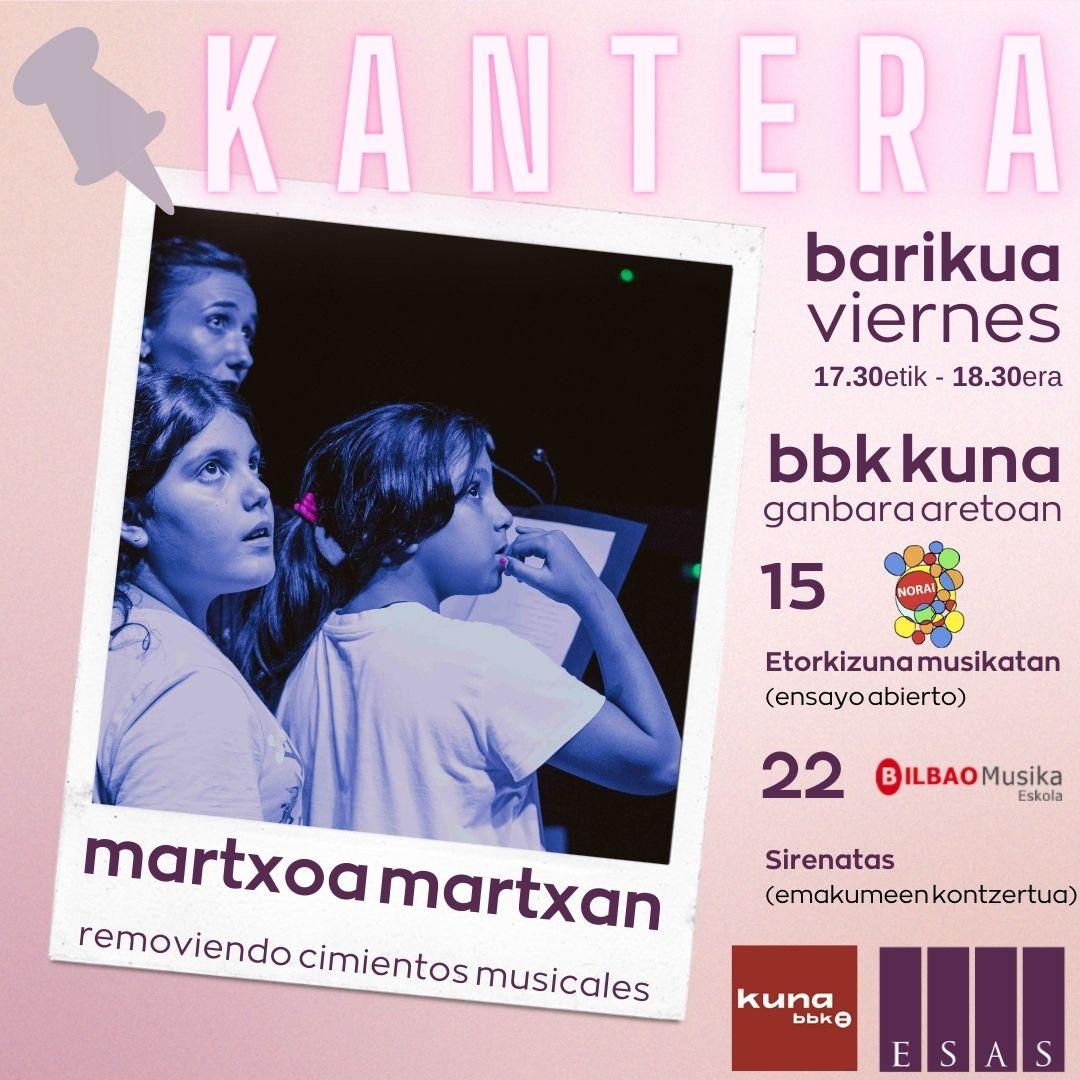
ESAS, promoters of the Kantera project: “Kantera brings classical music to the neighbourhood in an inclusive way and gives visibility to the figure of women in music”
The Kantera programme will be held in BBK Kuna during the month of March. The initiative is launched by the ESAS Association, composed of professional women related to classical music.
We wanted to interview them to make ESAS known, what they do, what their goals are and delve into the Kantera programme.
Come with us to learn more about this interesting project.
How and why did the ESAS project come about?
The project originates as a (re)action on the reflection of the ultimate representation of classical music, the symphony orchestra. A projection we didn’t feel was adapted to our social context and, after several telephone calls and some audacity, we decided to put an orchestra together made up of and led by women professionals on and backstage. However, this action of positive discrimination was hidden in many backstage conversations and (re)encounters on different stages where we realised that many fellow-students were no longer at this professional level, they had fallen by the wayside and we found ourselves in a very masculine environment highly segregated by specialization with a clear lack of references. The last being the most alarming shortcoming promoted by ESAS – Emakume Sortzaile eta Artisten Sarea, which not only gives visibility to women composers and performers, but also, conductors, musicologists, mediators, educators, managers, producers, stage managers, and many more professionals who make it possible for music to continue playing, in the hope that one day it will do so in equal terms.
What is the reality of the women who work in classical music?
Historically, women have not been able to dedicate themselves professionally to music, they have done so only as part of an education which remained within the home and having the piano, harp or violin as the main instruments. For this reason, despite the remedial work being carried out, many musical pieces written by women are still overlooked and the references are late in coming. The “positions of power” are mostly taken by men and the feeling that haunts us is the perpetual demonstration, that being good is not enough, the demand for excellence is something which is intrinsic in our profession, but we feel judged more so because we are women.
We know this discourse may sound victimized and that is why we base ourselves on objective data, promoting research and adding the gender variable into our studies, realising that our reality is not very different to the reality of many women who carry out their professional activity in other artistic, sports or highly competitive fields and is neither far removed from other professions that require full dedication, making the well-known “conciliation” complicated.
How many women make up ESAS today and what kind of profiles do you have?
Our database represents more than one hundred people who sent their proposals or availability in order to collaborate with us through different channels (website / SM / events), ranging from composition, conducting, performing, mediation or education, to disciplines such as literature, cinema, theatre, photography or dance. The start-up and operation so far, has been carried out, simultaneously along with a busy working life, between three of us: a woman violinist expert in production, communication and intercultural mediation; a woman flautist specialised in management and dissemination of music; and a woman orchestra conductor. Very diversified profiles but limited for the workload ESAS entails, so we have recently increased the team with another four colleagues, who in addition to having higher music qualifications, are trained in marketing, music therapy, social education… and we have created a stable working group in ESAS Classics, chamber group made up of ten instrumentalists. Between all of us, the same leitmotiv, together our sound is much greater.
Is the situation in the Basque Country different in comparison to other parts such as at a state or international level?
The people who live in the Basque Country and in Europe in general are fortunate. We have received strong support from public institutions, pointing out the Bizkaia Provincial Council, and private entities, such as BBK Kuna who has provided us with the space to carry out our activity. Perhaps for this reason, unconsciously, our efforts are more directed to this context. However, we always try to keep a global vision. Through our experiences of the actions we have carried out in Madrid (Ombudsman) or Barcelona (Esmuc), we don’t believe there are major differences at a state level, however we believe that our project here will have an expiration date but once it is consolidated, it will be perfectly adaptable to other territories, responding to a problem that affects us all.
What type of projects and initiatives do you carry out?
So far, we have provided may “advisory” services for specific events, designing ad hoc proposals. However, we have recently prioritised projects with our own brand. In fact, in March we have reserved the studio to lock ourselves in to record our first demo. A ground-breaking proposition with unpublished music, attracting audiences to the off-stage comfort of classical music.
In the educational sphere we present the ESAS award – Musikene (Higher School of Music of the Basque Country) to the most outstanding work with a gender perspective and collaborate with the UPV/EHU and other educational institutions through conferences or workshops. Additionally, we have started to give music lessons in AMUGE this year, we premiere the Kantera cycle in BBK Kuna with students from musical education centres in Bilbao and giving shape to a project in Cruces Hospital which we are especially excited about.
When you talk about multidisciplinarity, what do you refer to in practice?
In the arts collaborating between specialities has always been practiced. In fact, music has always been directly linked to dance or audiovisually. Despite our profession being linked to hearing, we like to create experiences in with which to enjoy using the five senses, caring for the image and projecting immersive shows within our skillset, a field we would like to delve further into. For instance, in our latest creation, the poems on which the music was based were recited, the performers acted from different parts of the hall, the dancers mixed themselves into the audience, in addition to playing with projections and lights. We settle for the listening, seeking to captivate and make audiences be devoted to attending contemporary music concerts. In addition, with every step we take we are joined by professionals from other branches in order to generate this working network which takes place between music, graphic arts, scenography, photography, … they all take part in the creative process
The social component is essential for you, what projects do you undertake in this respect?
Indeed, the social component is key since we are a non-profit association that works – without pay – to make a more equal society, using culture as a transformation tool and eliminating the prejudice that classical music is elitist. Our latest collaboration was with AMUGE (Roma Women of the Basque Country) in the Txiki Calé that empowers Roma girls, making them believe in their abilities through musical training without preconceived limitations.
We also have a collaboration agreement with the Norai Association and its integration project, through a symphony orchestra with young people that for different reasons are at risk of social exclusion. We have undertaken different initiatives with them, from visiting their classes to inviting them to our activities so they can be present in the rehearsals, in the management processes, the production and meet the artists first hand. Our next initiative is to provide them with works of music of women composers of our network that they can incorporate into their repertoire given that on occasion it is complicated for them to incorporate women’s repertoires into their programming.
Education is, undoubtedly, an essential element for promoting culture itself, as well as the aspect of inclusion and equality in all areas. What do you think classical music can contribute today?
In the contemporary context, it is essential for us that our society be able to engage in dialogue despite having a different language. All voices have a place and converge harmoniously. Having the capacity to listen and communicate in a different code is a virtue that can be acquired through musical practice. Music has no barriers, it is universal, but above all, beyond the aesthetic component and developing aspects such as creativity, coordination and rhythm, it involves discipline, values, companionship, respect and managing emotions; essential in basic education.
What does the view from a woman’s vision contribute to the reading of classical music?
As in everything, perspective. It is another point of view which until relatively recent times had not been contemplated with male supremacy prevailing, and this view is, to say the least, as valid and enriching as that of a man.
You presented the Kantera educational cycle in BBK Kuna as a revolution in musical education, while promoting integration and gender equality. What is it about?
Kantera has been designed thinking about the Plaza de la Cantera and the people of the neighbourhood who do not usually go to classical music venues. Therefore, through BBK Kuna we want to bring it to them and generate a local audience and performers, to encourage generational renewal and motivate the learning process when getting out of the usual scenario. In this first edition, the participants are Bilbao Musika and Norai with two very different proposals. The former, is a programme of women composers, the latter, an open rehearsal with only music by men and upon which the figure of women in music throughout history is discussed, underscoring the fact of not having a repertoire of women composers to perform. The cycle invites teachers as well as students to discuss and pursue repertoires of women that are not usually worked upon because they are not integrated in any programming and in turn, invite the participants to learn about other realities outside the classroom, promoting the meeting of young people using music as a shared interest.
What are the programme’s goals and how will these be developed?
The goals are to raise awareness in students, teachers and audiences about the situation of women in music, making their repertoire known, in addition to offering new scenarios and display the work of students from different musical centres to the public of Bilbao. It will be held on Friday afternoons in March, a very significant month which we hope that, in addition to tingeing everything the colour purple, it will ring out with a first concert called “Sirenatas”, which will spotlight repertoires neglected until now.
The second proposal, “Etorkizuna entseatzen”, is an open class format which addresses the evolution of the presence of women in our world through music and presentations and allowing their role to be known; in addition, we don’t want to miss the chance of the attendees learning about the Etorkizuna musikatan initiative carried out by Norai.
Who can participate in Kantera and how?
Although we conceived this cycle thinking about the areas that are more remote from downtown Bilbao where not many cultural activities are held, Kantera is open to all music education centres who want to work on the gender perspective with their students and give visibility to this work. A priori, in the month of March, by joining the initiatives of women’s month. However, we hope that the initiative will consolidate itself and be a regular event in the programme, since for us women, March and M8 occurs 365 day a year. The concerns / curiosities /proposals may be sent through our dissemination channels: at RRSS @somosesas, the contact form on our website esas.eus or via email to kaixo@esas.eus.
